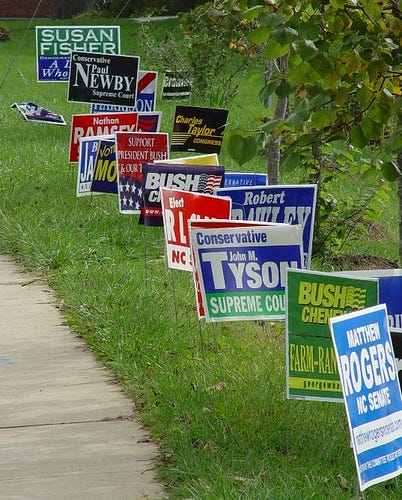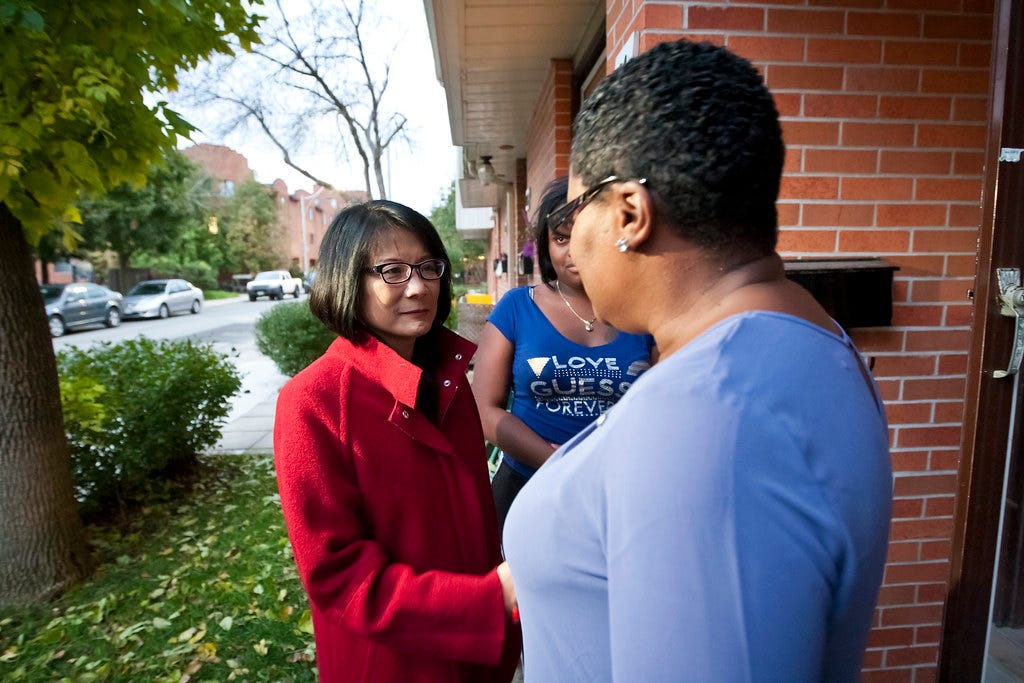Bruce Abernethy: What drives dishonesty in politics?
Candidates’ lack of candor is primarily a function of, not the candidate, not the electoral process, but the electorate. Us.
Housekeeping
Upcoming posts include: Tim Nesbitt, Susheela Jayapal, Adam Davis, Hilary Dumitrescu, Thomas Ngo, Mark Owens, Jim Moore, and Eric Ward.
Coming up Saturday: Chapter 2 of Rediscovering the Oregon Way.
Read Chapter 1 here.
Welcome new contributor, Mark Hass. Read his first post here.
Now to the post!
Member of the Bend City Council and COCC Board of Directors. Bruce is also a grantwriter with the Bend-La Pine School District.

I’ve been personally involved in local politics for many years and a keen follower of state and national politics since my early teens. After mounting an unsuccessful run for the Oregon Legislature in 1994, I’ve had success running for the board(s) of the Bend Park and Recreation District, Bend-La Pine School District, and Central Oregon Community College as well as for, most recently, the Bend City Council.
In this piece, I want to provide a behind-the-scenes look at some of the incentives and disincentives that candidates face when choosing how honest to be with the public about their positions. These findings are obviously not applicable in all situations, but they are intended to provide at least a partial response to that age old question – why is it that politicians are not honest with the public?
In my experience, there have always been incentives for candidates – including myself - to withhold information, straddle on issues, and generally be less than forthcoming. But is this lack of candor a function of the individual, the election process or the electorate/voters - or - is it a combination of all three?
I bet most people would say that this type of candidate behavior is wrong because it represents a failing of the individual and is due to a moral weakness. While that’s surely true in many instances, I would argue that it is also a product of candidates responding rationally to the many incentives voters put in place for them not to be open and transparent!
This list of incentives includes, but is not limited to:
voters tend to feel more strongly about what they disagree with than what they support,
single-issue voters, and
negative advertising.
Let me walk through each of these, noting the way that voters’ attitudes, norms, and expectations create often subtle incentives for candidates to act the way they do.
Two takeaways from my own campaigning are that 1) people tend to feel more strongly against positions than they do for positions, and 2) the single-issue voter is a constant landmine for the candidate. For a candidate, the combination of these two can be disastrous as many voters will prefer the candidate with name recognition or a particular party’s endorsement whose positions they do not particularly know over the candidate they basically agree with on 80% of the issues but strongly disagree with on 20% of the issues.

I saw this firsthand during my initial campaign back in 1994. I was going door-to-door and introducing myself to prospective voters. Before ringing one doorbell, I looked at my voter registration sheet so I knew the occupant was a consistent voter, female, and age 45+, but precious little other than that. Our conversation was the typical “candidate on the front doorstep being grilled by the voter just inside the house” as she asked me how I stood on various issues.
She liked my responses to questions A and B. She seemed persuaded by my response to question C and I was very excited to see that she seemed to really like my answer to question D, too. After answering question E, I was feeling great. And then it all fell apart. She did not like my answer to question F. At all. Question F wasn’t even the first question that came to her mind to ask – it was her sixth - but just like that, I knew I had lost her vote.
Could I have said something different? Should I have said something different? There are single-issue voters all across the spectrum on issues like abortion (are you pro-choice or pro-life?), guns (are you a 2nd Amendment supporter or someone who wants to address the “other epidemic” of gun violence?), and the environment (is climate change real or a hoax?). These are the proverbial “third rails” of politics where it is often in the candidate’s best interest to waffle, perhaps leaving voters with the vague impression they agree with them or at least are not opposed to their view.
In order to avoid taking a “wrong” position on an issue a voter feels strongly about, one highly effective communications strategy is for the candidate to adopt a vague-but-inspirational mantra like “Hope,” “Change” or even “Make America Great Again” and get voters to fill in many of the details themselves, projecting their own policy positions onto the candidate.
I’m not particularly proud of this next anecdote, but I think it proves my point (and that I was moving along my learning curve as a candidate). Later that week, I was out again knocking on doors and the person was querying me about my stands on various issues. The way they asked a particular question, I could tell they weren’t going to like my response if I was honest. In fact, I completely disagreed with this person’s position. But, I tried something new.
With an engaging smile on my face and lots of nodding, I said, “You know what, that’s the exact same thing I’ve heard about from a lot of your neighbors!” It worked. They were placated at least temporarily and I was able to live on to try to answer another question.

The third reason candidates are less than forthcoming is negative or misleading advertising (and I hasten to add that fortunately this was not at all an issue in my own 1994 campaign loss). Despite the constant hand-wringing every year and a (at least perceived) wish that campaigns will stay positive, that almost never seems to happen. Why do politicians run negative or misleading ads? Because they work and because there hasn’t been a sufficient backlash or consequence for running them.
There are lots of reasons why elected officials may have voted for or against a particular bill or taken a particular stand on an issue. They are often hugely complex topics and represent a compromise/tradeoff of accepting some bad along with the good. But the thing about political advertising is you can frame things the way you want, pulling out a particular element – a quote or even an unflattering photo - that you know will paint your opponent in a negative light. Also, by running a negative ad about their opponent rather than a positive ad about themselves, candidates avoid inadvertently losing single-issue prospective voters by disclosing their own “wrong” position.
In closing, my conclusion is that candidates’ lack of candor is primarily a function of, not the candidate, not the electoral process, but the electorate. Us. This article was not intended to defend all candidate’s evasion, but rather to help voters realize the role we play collectively in contributing to the behavior we claim not to want from our politicians.
Unfortunately, I’m fairly pessimistic about our ability to change this, as it has deep roots in our psychology as voters, and is being exacerbated by our increased reliance on highly questionable social media platforms.
If I were asked to put on my optimist hat, I think the most effective things we can do are to try to increase the “cost” of evasion by changing the electoral process and finding ways to support more neutral arbiters. What would this look like? Newspapers and corresponding websites should publish each candidate’s position on all the important issues, and debate moderators should explicitly say when a candidate has not answered their question. By thereby drawing voters’ attention to a candidate’s evasion, these measures increase the cost of that evasion.
We need also to find a way of coalescing around an unbiased arbiter of information - the League of Women Voters comes to mind and I am hoping that once we have moved past the Trump Presidency, a site like Politfact can again be universally trusted and provide an effective way of minimizing falsehoods.
Additionally, we need to recognize that a “special interest” is not just a cause or organization with which you disagree, but understand that everything you read, see or hear has a bias and you need to account for that in how you process the information.
Finally, we should look to Benton County and see how their test of ranked choice voting shifts the incentives facing candidates. Theoretically, this approach to elections still permits single-issue candidates and voters to have their stance made clear, while not destroying the chances of a candidate who otherwise shares the voter’s views, but for that one issue.
**************************************
Keep the conversation going:
Facebook (facebook.com/oregonway)
Twitter (@the_oregon_way)
Check out our podcast:
#113


